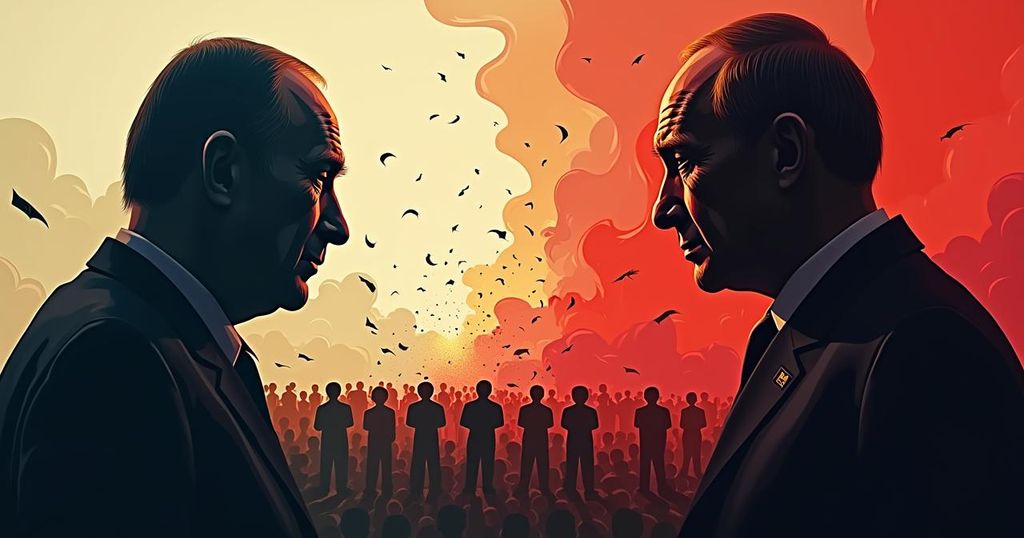Russia’s Strategic Interests Amid the Israel-Iran Escalation

The article examines the implications of the Israel-Iran escalation for Russia’s foreign policy, highlighting Moscow’s strategic interests in maintaining influence while avoiding direct military involvement. The ongoing conflict complicates Russia’s alliances, particularly with Iran, as it navigates the geopolitical landscape shaped by U.S. support for Israel. Analysts emphasize Russia’s preference for chaos in the region over war, reflecting on its historical connections to Lebanon and Hezbollah.
The ongoing escalation of hostilities between Israel and its military adversaries in Lebanon and Iran presents a complex scenario for Russia, which has been attempting to navigate its geopolitical interests amid the turmoil. Russian researcher and documentarian Anna Levina, residing in Beirut, has been anticipating Israel’s intensified military actions following the exchange of missiles between Hezbollah and Israel. Reports suggest that recent Israeli offensives have resulted in significant civilian casualties and widespread devastation in Lebanon, further complicating Russia’s strategic posture in the Middle East. This situation has renewed discussions on Russia’s foreign policy under President Vladimir Putin, particularly in relation to its quest for a multipolar world order that stands apart from U.S. hegemony. Analysts have noted that while Russia is calling for a diplomatic resolution to the escalating conflict, its efforts are often met with resistance, primarily due to the unwavering U.S. military support for Israel. Moscow has condemned Israel’s military maneuvers in Lebanon and has called for restraint from both Iran and Israel, signaling that it is neither seeking to become embroiled in a potent military confrontation nor upholding a singular ally amid the chaos. In addition, the alliance between Russia and Iran has strengthened, particularly in the context of the conflict in Ukraine, as Iran has provided military support to Russia. There are indications that Russia is increasingly dependent on Iranian military resources, which have seen a surge in demand amidst the ongoing hostilities. However, analysts point out that while Russia acknowledges the potential benefits of regional instability—which diverts U.S. attention from its operations in Ukraine—it does not desire a full-scale war that could destabilize its interests further. Despite historical ties to Hezbollah and Lebanon, which have remained complicated, Russia is keen to maintain a semblance of influence and control, especially given its strategic stake in Syria. The Kremlin appears to be leveraging its relationships to mitigate heightened tensions and facilitate dialogue. Levina expressed a sentiment shared by many observers, noting the cyclical nature of Israel’s military invasions of Lebanon and the potential repercussions of their actions. Overall, as the conflict unfolds, Russia’s dual interests of fostering regional chaos to its advantage while simultaneously steering clear of direct military engagement encapsulate the intricate dynamics at play in this volatile landscape.
The article discusses the intricate geopolitical situation surrounding the escalating conflict between Israel, Iran, and Hezbollah, particularly focusing on how it impacts Russia’s strategic interests. Historically, Russia has had complex ties with Lebanon and Hezbollah, particularly during the Lebanese Civil War, and has increasingly aligned itself with Iran for military support in its operations, specifically regarding the Ukraine conflict. Analysts indicate that while Russia benefits from regional unrest as it distracts U.S. attention from other geopolitical fronts, the Kremlin does not wish to engage in a major war. The commentary also reflects on Russia’s efforts to mediate tensions amid the chaos, signaling a nuanced approach to its Middle Eastern alliances and interventions.
In summary, the conflict between Israel and its adversaries presents a multifaceted challenge for Russia, which seeks to balance its alliances with Iran and Hezbollah while avoiding a direct military confrontation. Russia’s dependence on Iranian military assistance contributes to its strategy in the region, but analysts note a clear preference for chaos over large-scale warfare. As the situation evolves, Russia’s historical ties and present-day engagements underscore its complex relationship with the Israeli-Iranian conflict.
Original Source: www.aljazeera.com








